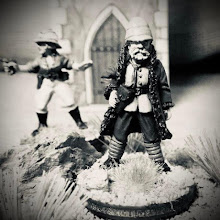 Field Marshal Stapleton Cotton, 1st Viscount Combermere GCB, GCH, KSI, PC, etc., British Field Marshal and Colonel of the 1st Life Guards was born on 14 November 1773. He served under Arthur Wellesley, 1st Duke of Wellington in the Peninsular War with distinction.
Field Marshal Stapleton Cotton, 1st Viscount Combermere GCB, GCH, KSI, PC, etc., British Field Marshal and Colonel of the 1st Life Guards was born on 14 November 1773. He served under Arthur Wellesley, 1st Duke of Wellington in the Peninsular War with distinction. He was educated at Westminster School and when only sixteen obtained a second lieutenancy in the 23rd Regiment of Foot. A few years after wards (1793) he became by purchase captain in the 6th Dragoon Guards and he served in this regiment during the campaigns of the Flanders. While yet in his twentieth year, he joined the 25th Light Dragoons (subsequently 22nd) as Lieutenant Colonel.
In 1796 he went with his regiment to India taking part en route in the operations in Cape Colony (July–August 1796), and in 1799 served in the war with Tippoo Sahib, and at the storming of Seringapatam. Soon after this, having become heir to the family baronetcy, he was, at his father's desire, exchanged into a regiment at home, the 16th Light Dragoons. He was stationed in Ireland, became a Colonel in 1800, and Major General five years later.
The Peninsular War (Now the stuff we need for gaming this period!)In 1808 he was sent to the seat of war in Portugal where he shortly rose to the position of commander of Wellington's cavalry and it was here that he most displayed that courage and judgment which won for him his fame as a cavalry officer.

Cotton was nicknamed the "Lion d'Or" during his Peninsular War years, because of his fearlessness and the ostentatious splendour of his uniforms and equipment. He succeeded to the baronetcy in 1809, but continued his military career. His role in the Battle of Salamanca (22 July 1812) was especially notable and he received the personal thanks of Wellington. He displayed coolness under fire at the Battle of Venta del Pozo on 23 October 1812 where he led the army's rearguard. He was now a Lieutenant General in the British army and a Knight Commander of Bath and on the conclusion of peace (1814) was raised to the peerage under the style of Baron Combermere.
Cotton was not present at Waterloo, even though Wellington wanted him to have the command, which he expected and bitterly regretted not receiving, having been given to Lord Uxbrigde.

When the latter was wounded Cotton was sent for to take over his command, and he remained in France until the reduction of the Allied army of occupation.
I plan on finishing Cotton's base today while waiting for Alabama Football!



Interesting bit of history. Fine painting.
ReplyDeleteNice paint job - I especially like the leopard skin...
ReplyDeleteI also liked the potted history - it's what the hobby is all about - the history, the models and the games..